Samsung SSD 840 Pro (256GB) Review
by Anand Lal Shimpi on September 24, 2012 7:00 AM EST- Posted in
- Storage
- SSDs
- Samsung
- Samsung SSD 840
Random Read/Write Speed
The four corners of SSD performance are as follows: random read, random write, sequential read and sequential write speed. Random accesses are generally small in size, while sequential accesses tend to be larger and thus we have the four Iometer tests we use in all of our reviews.
Our first test writes 4KB in a completely random pattern over an 8GB space of the drive to simulate the sort of random access that you'd see on an OS drive (even this is more stressful than a normal desktop user would see). I perform three concurrent IOs and run the test for 3 minutes. The results reported are in average MB/s over the entire time. We use both standard pseudo randomly generated data for each write as well as fully random data to show you both the maximum and minimum performance offered by SandForce based drives in these tests. The average performance of SF drives will likely be somewhere in between the two values for each drive you see in the graphs. For an understanding of why this matters, read our original SandForce article.
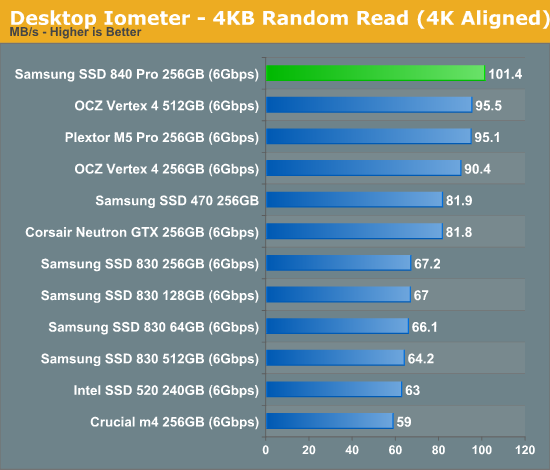
We have a new king, the 840 Pro manages to inch past the fastest Vertex 4 in our random read performance test.
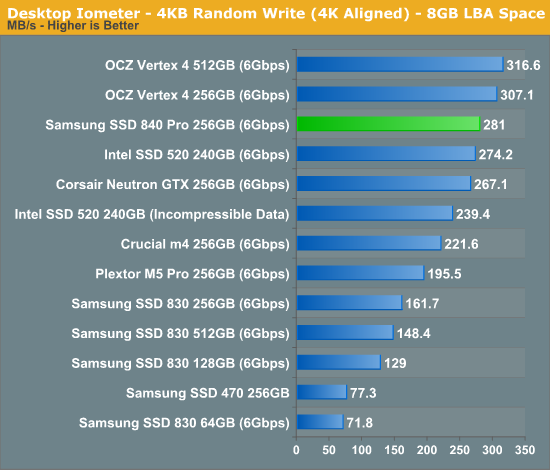
The low queue depth random write performance crown goes back to the Vertex 4, but the 840 Pro is around 75% faster than the old 830. Other than the Vertex 4, there's nothing faster than the 840 Pro here.
Many of you have asked for random write performance at higher queue depths. What I have below is our 4KB random write test performed at a queue depth of 32 instead of 3. While the vast majority of desktop usage models experience queue depths of 0 - 5, higher depths are possible in heavy I/O (and multi-user) workloads:
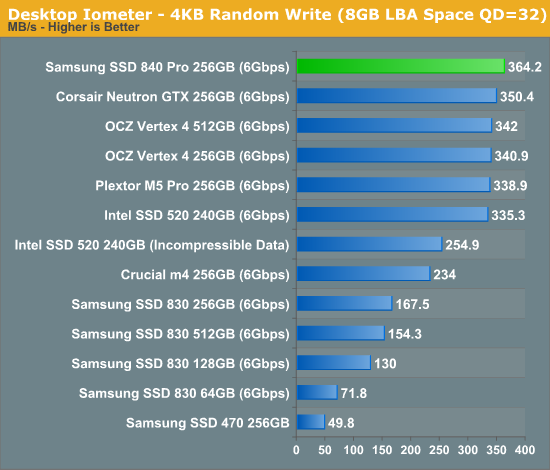
Ramp up queue depth and the 840 Pro manages to even outperform Corsair's new Neutron GTX.
Sequential Read/Write Speed
To measure sequential performance I ran a 1 minute long 128KB sequential test over the entire span of the drive at a queue depth of 1. The results reported are in average MB/s over the entire test length.
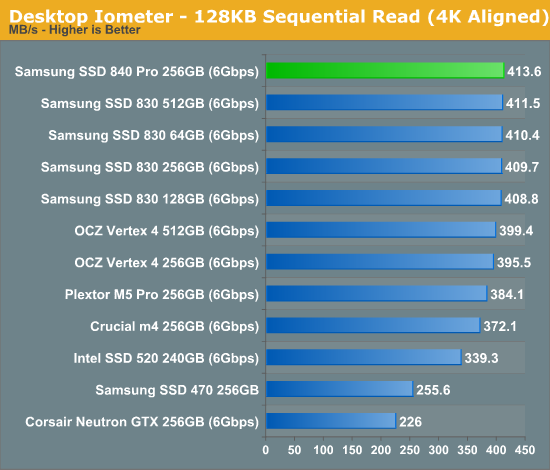
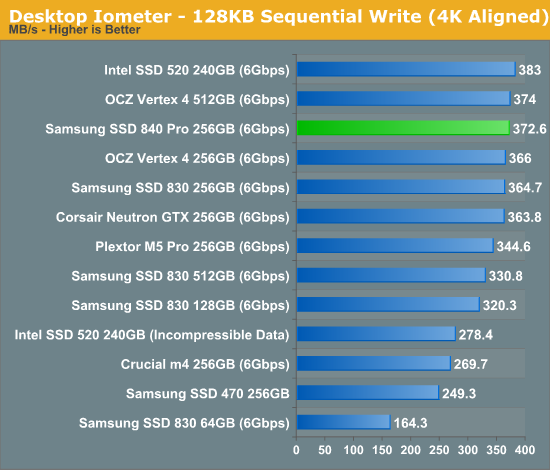
There are no tradeoffs here: excellent random IO performance and class leading low queue depth sequential performance. The 840 Pro is looking like a good all-around performer.
AS-SSD Incompressible Sequential Performance
The AS-SSD sequential benchmark uses incompressible data for all of its transfers. The result is a pretty big reduction in sequential write speed on SandForce based controllers.
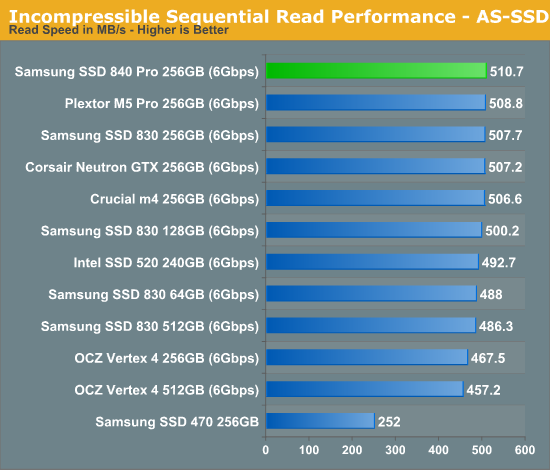
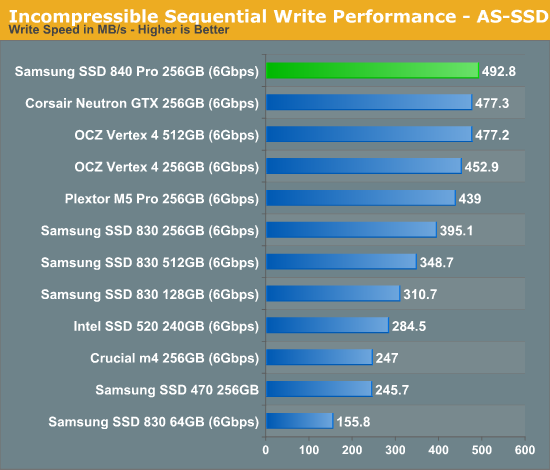
The 840 Pro lands on top once again in these higher queue depth sequential tests. The competition is hot on the heels of the 840 Pro however, we're limited by 6Gbps SATA here so expect continued clustering around 500MB/s going forward.










96 Comments
View All Comments
Benny_k80 - Thursday, November 15, 2012 - link
Me too. I'm about to order one but i wont do it until i get any clarification :(Beaver M. - Sunday, November 18, 2012 - link
I guess thats why they are still not available/have been not available for so long.Still, Samsung should have told Anandtech already whats going on...
KenCl - Monday, November 26, 2012 - link
I'm seeing them in stock all the time now. I was just about to order one when I saw that updated comment about both samples dying. I was patting myself on the back for not jumping in on the bleeding edge and had decided that now the technology is mature enough and reliable plus the comfort of the 5 yr warranty so time to dive in....Of course, 2 samples dying, while a bit off putting, is far from statistically significant.
Well, there are a lot of good deals on Intel SSD's right now....
gerlin - Thursday, January 24, 2013 - link
Has anyone successfully enabled encryption?When I enable the HD Password setting in my BIOS, as soon as I reboot the laptop and enter the password when prompted I get a disk error message. I have tried this on two different ThinkPad laptops and with two different SSD 840 Pro Drives.
Luckily, I can go back into BIOS, enter the password I created and remove the password and the drives show up fine. I read that some OCZ SSD drives had issues with BIOS passwords and that was fixed with a SSD firmware update. I don't know if this has a similar issue with my ThinkPads.
I talked to Samsung support, though they basically said it should work and they have not heard of any issues. I don't think many users actual enable the BIOS HD Password (and therefor enable the encryption protection).
I don't think there is really anything I could be doing wrong *though I would be happy is someone could tell me I am), since it is a simple matter of just enabling the password in BIOS. I know I am using the assigned password and that the drive accepts it, since it lets me past the prompt when I put the correct password. The problem is that at that point the drive looks invalid to BIOS. It doesn't just skip the drive, I get a "Error 0200 Failure Fixed Disk 0" error and my only option is to enter BIOS.
I have an old conventional drive with hardware FDE that works fine on the same laptop.
So, again, I am just wondering is this is working for anyone else?
Breta - Monday, February 25, 2013 - link
Beware of these drives. They are not reliable. I have 2 piece of this. They can't be used in the RAID Array. They freeze in the range 2-48 hours and become unavailable to next computer power off/on cycle. Samsung refuses any support to correct this bug. Samsung support said."Samsugn does not provide RAID support regarding the units. The units can be placed in the array however it is at the users discretion."
TorwaK - Wednesday, April 3, 2013 - link
Thanks for the heads up. I was planning to buy 2 units of 840 Pro and use them in RAID 0 mode. :(